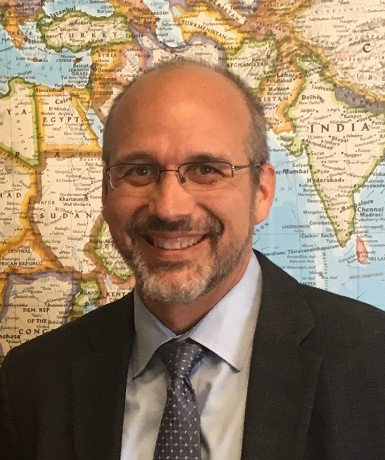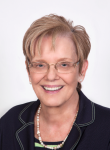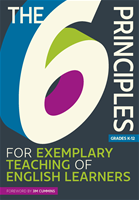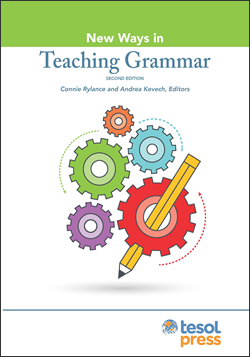From the Executive Director: Raising TESOL's Voice
by Christopher Powers
 Earlier this fall, we celebrated an exciting election. No, not the U.S. midterm elections or the Brazilian general election, though they were interesting enough. I am talking about TESOL’s election—where you, our members, choose a new president-elect, three new members of the TESOL Board of Directors, and a brand new Nominations Committee. TESOL elections have little in common with national elections, and, thankfully, they lack the partisanship and divisiveness we see too often in national politics. But like national elections, TESOL’s elections give us the opportunity to engage and raise our voices. They let us define the kind of association we want to be. And that is critically important.
Earlier this fall, we celebrated an exciting election. No, not the U.S. midterm elections or the Brazilian general election, though they were interesting enough. I am talking about TESOL’s election—where you, our members, choose a new president-elect, three new members of the TESOL Board of Directors, and a brand new Nominations Committee. TESOL elections have little in common with national elections, and, thankfully, they lack the partisanship and divisiveness we see too often in national politics. But like national elections, TESOL’s elections give us the opportunity to engage and raise our voices. They let us define the kind of association we want to be. And that is critically important.
In September, I laid out TESOL’s new Strategic Plan, and last month I focused on our Global Presence and Connectivity. This month, I want to address another important outcome we hope to achieve. By raising the voices of our members, we seek to become the leading advocate for English language teaching professionals and learners worldwide. Though raising our voices in elections, whether for an association or parliament, is important, voice is so much more than that.
It means speaking up to denounce injustices that threaten our students.
It means rising to defend our values.
And it means standing to support our fellow teachers.
I want to encourage all of you to participate in advocacy-themed sessions at the TESOL Convention and attend our annual Advocacy & Policy Summit in June. At the summit, we will focus on important legislative goals, such as passing the Reaching English Learners Act, and administrative objectives, like a strong and independent Office of English Language Acquisition in the U.S. Department of Education. We will also help provide you with the skills and knowledge to advocate in your own context and in your own way. Because advocacy, of course, must mean more than just promoting national policies. It must mean fighting for students in the classroom and in the community. It must mean promoting the expertise of TESOL professionals to principals, school boards, and fellow teachers. As David Cutler, our policy and communications manager, writes in his new advocacy blog, it must mean doing “whatever we can to ensure the success of every English learner.” And, most important, it is about living, breathing, and promoting our values in all of our professional interactions.
Another way that TESOL is helping to raise our collective voice is through the Action Agenda for the Future of the TESOL Profession. The agenda outlines five priorities that all of us—including individuals, organizations, and policy-making bodies—can embrace. The priorities are:
- Strengthen the status and visibility of the profession
- Redesign English language education programs to foster global engagement
- Mobilize leaders to confront and embrace the challenges and complexities of English language teaching
- Expand capacity for inclusive and comprehensive research
- Cultivate a culture of innovation that is responsive to global trends
We invite you to visit www.tesol.org/actionagenda to identify which action steps you and your organization can adopt.
Who has the strongest voice? Who are our best advocates? We are. TESOL members are. Thank you for raising your voices and advocating for yourselves, our colleagues, and our students every single day. If TESOL is to become the leading advocate for English language teaching professionals and learners worldwide, we need everyone to embrace and celebrate this fundamental component—advocacy—of TESOL educators.
Christopher Powers
TESOL Executive Director
Email: cpowers@tesol.org
Twitter: @TESOL_Powers
TESOL Blogs
Interested in writing a blog for TESOL?
Read the submission guidelines and send us your post!
Check out some of the most recent TESOL Blogs:
|
The Unapologetic Advocate: Why We Advocate, by David Cutler
 This blog has been a long time coming. Truth be told, I put this off for a long time; not because I had no idea what I wanted to say, but because I didn’t know how to say it. I decided on the version that reflects me the most: the brutally honest, oftentimes sarcastic, unapologetic one. I’m well aware that my style might be different than what is normally posted in this space, but I also think we shouldn’t be afraid to be honest about how we feel, what we’re thinking, and who we are, especially when it comes to advocating for the things we care about. So, if you came here expecting a black and white picture on advocacy, I’m not sorry; advocacy and policy work is as gray a picture as you can get. Read more. This blog has been a long time coming. Truth be told, I put this off for a long time; not because I had no idea what I wanted to say, but because I didn’t know how to say it. I decided on the version that reflects me the most: the brutally honest, oftentimes sarcastic, unapologetic one. I’m well aware that my style might be different than what is normally posted in this space, but I also think we shouldn’t be afraid to be honest about how we feel, what we’re thinking, and who we are, especially when it comes to advocating for the things we care about. So, if you came here expecting a black and white picture on advocacy, I’m not sorry; advocacy and policy work is as gray a picture as you can get. Read more.
|
|
Video for ELT, Episode 1: TED Talks, by Greg Kessler
 There are many engaging ways to use video and video creation projects in teaching English. There are also, of course, numerous videos online that can be useful in various English teaching contexts. Video streaming sites such as Vimeo and YouTube provide access to a seemingly endless supply of video content, but this can quickly result in the sensation of being overwhelmed and leave teachers uncertain of where to begin. Read more. There are many engaging ways to use video and video creation projects in teaching English. There are also, of course, numerous videos online that can be useful in various English teaching contexts. Video streaming sites such as Vimeo and YouTube provide access to a seemingly endless supply of video content, but this can quickly result in the sensation of being overwhelmed and leave teachers uncertain of where to begin. Read more.
|
|
Language Acquisition vs. Language Learning in Elementary School, by Judie Haynes
 One of the questions I am most frequently asked is how I teach grammar rules to young English learners (ELs). Well, the truth is that I never taught out-of-context grammar to young students. I learned early in my career that research shows that grammar drills do not work with students of any age. According to Krashen (1988), a linguist specializing in theories of language acquisition and development, there is an important distinction between language acquisition and language learning. Read more. One of the questions I am most frequently asked is how I teach grammar rules to young English learners (ELs). Well, the truth is that I never taught out-of-context grammar to young students. I learned early in my career that research shows that grammar drills do not work with students of any age. According to Krashen (1988), a linguist specializing in theories of language acquisition and development, there is an important distinction between language acquisition and language learning. Read more.
|
TESOL Bookstore

Featured Resources from TESOL Press
 The 6 Principles for Exemplary Teaching of English Learners
The 6 Principles for Exemplary Teaching of English Learners
With a Foreword by Jim Cummins
TESOL International Association Writing Team
As the number of English learners around the world soars, so does the need for quality English language instruction. TESOL International Association has furthered its ELT leadership role by defining a core set of principles for the exemplary teaching of English learners. The 6 Principles will help you make informed decisions to improve English language instruction and assessment. These foundational principles are for all educators and are applicable across different educational settings. This book features a detailed explanation of The 6 Principles, practical applications for your classroom, ideas for building a strong community of practice, and more!
 New Ways in Teaching Grammar, Second Edition
New Ways in Teaching Grammar, Second Edition
Connie Rylance and Andrea Kevech
Unsure of how to include creativity and project-based learning in grammar lessons? The 2nd edition of this best-selling book includes updated activities and new contributions that cover a wide range of teaching techniques -- from introducing a specific grammar point to providing meaningful, contextualized practice.
 More Than A Native Speaker: An Introduction to Teaching English Abroad, Third Edition
More Than A Native Speaker: An Introduction to Teaching English Abroad, Third Edition
Don Snow and Maxi-Ann Campbell
In this newly updated third edition, learn step-by-step how to effectively teach English abroad. Gain valuable tips and resources for teaching in an unfamiliar educational system, working with students of varying ages and skill levels, and adapting to life in a different culture. A rich array of online resources and activities included.